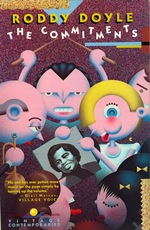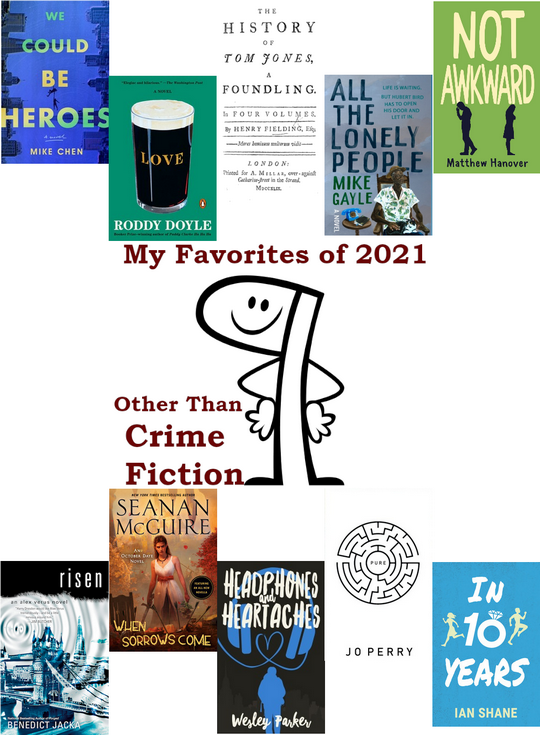
Back when I started this site, I knew the content would be largely “genre”-oriented. I’d have wagered the content would be roughly 1/3 Mystery/Detective fiction, 1/3 Urban Fantasy, and slightly less than 1/3 SFF, with “non-genre” fiction, humor, and non-fiction being enough to make my one-thirds just an approximation (honestly, if you asked me what I read regularly, that’s pretty much how I’d describe it today). Actual numbers show that’s wrong—it’s almost 40% Crime/Thriller Fiction, and Urban Fantasy has only topped 20% once in the last decade—it was 16% the last two years, SFF combined for about 14% in 2021.
Which is just a long-winded way to get to these two points: because Crime Fiction takes such a big chunk of my reading, it gets its own “Favorite” list, but none of the others really garner enough numbers for their own.
As always, re-reads don’t count—only the works that were new to me.
(in alphabetical order by author)
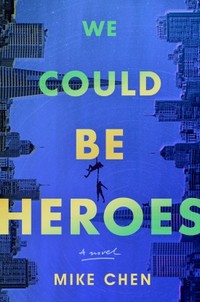 We Could Be Heroes
We Could Be Heroes
by Mike Chen
My original post
A super-hero and a super-villain become friends after meeting (as civilians) at a support group meeting and delve into their shared past to figure out how they got their powers and who they used to be. That old story. 

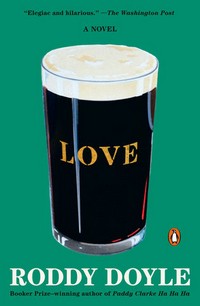 Love
Love
by Roddy Doyle
My original post
This is about as close as you can get to a novel without a plot. You’ve got a pair of old friends, getting together for drinks (many, many drinks) and to catch up on each other’s lives. They end up revisiting their past (as you do), arguing about what really happened then, and seeing how it’s impacted where they are now. There’s more to it, but that’ll do for our purposes. The novel is primarily told through dialogue (although we do get memories and internal commentary from one of the men). As is to be expected from Doyle, that dialogue sings. You can practically hear it jump off of the page–I’m not sure I could conjure up a mental image of anyone in the book, but I know exactly what they’d sound like.

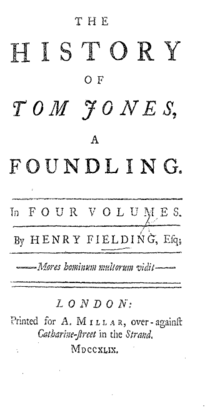 The History of Tom Jones, A Foundling
The History of Tom Jones, A Foundling
by Henry Fielding
My wrap-up post for the project
I read most of this in 2020, but didn’t finish it until 2021, so it goes on this list. Just for the (mostly rewarding) time spent on this book, it deserves a spot on this list. It’s not really the kind of book I thought it would be, but it’s so much more interesting. I’ve said enough about this book, I don’t really have it in me for more–it’s a classic, anyway, what can I say that hasn’t been said for hundreds of years?

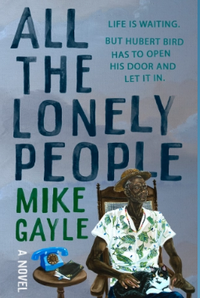 All the Lonely People
All the Lonely People
by Mike Gayle
My original post
This is nothing but an all-out attack on the cockles of your heart. I described it to a friend, “Imagine a book by Fredrick Backman–but instead of a crotchety old Swedish man, it’s about a lonely man who left Kingston for London in the 50s.” It’s so heartwarming, so Capra-esque, so…eh, you get the point.

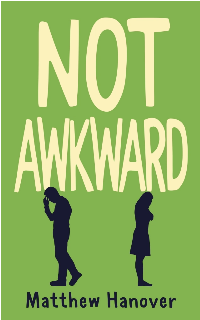 Not Awkward
Not Awkward
My original post
Hanover’s third Wallflowers novel came out last year and shows real growth as a writer, while not losing any of the charm, heart, and likability of his previous novels. Just before his wedding, Scott goes to the funeral for his ex’s father, and somehow ends up spending a few days with the family. Not Awkward is a warm and heart-filled story about revisiting the past, finding healing (whether or not you thought you needed it), and embracing a future that doesn’t look like you expected it would (and is probably better). It’s the kind of book that’ll make you feel a little better about life for a while—and who doesn’t want to read something like that?

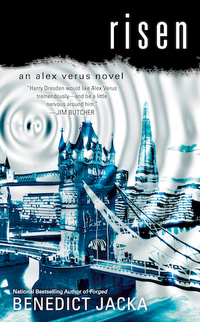 Risen
Risen
My original post
The twelfth and final book in the Alex Verus series blew me away. It’s one of the best series finales I remember reading. It was hard to say good-bye to this world and these characters, but Jacka did such a satisfying job with this novel that it took some of the sting out of it.

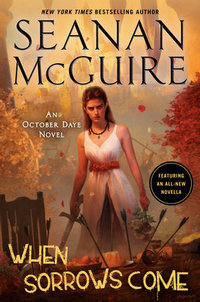 When Sorrows Come
When Sorrows Come
My original post
If (and that feels like a big “if”) October Day is going to get a Happily Ever After, it’s going to be years down the road. Thankfully, she got a “Happy Right Now” by marrying Tybalt. That’s pretty much what this novel is–a big dollop of happiness (with Toby putting down a palace coup along the way). It was so nice seeing that.

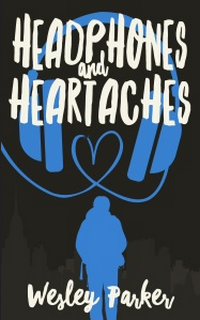 Headphones and Heartaches
Headphones and Heartaches
My original post
Percy’s a teen who gets put into Foster Care after his mother’s latest OD. While she’s in a treatment program, Percy comes to trust and love his foster mother–a woman with a huge heart, who takes in this boy and gives him a safe place to be for the first time in his life. This is a sweet book, a touching book—an occasionally hilarious book (with some truly cringe-worthy beats)—I guess it’s best summed up as a very human book. Parker got me to feel all sorts of things for these characters, to a degree I didn’t expect or was prepared for.

 Pure
Pure
by Jo Perry
My original post
(sure, you could make the case that this is Crime Fiction, but I don’t buy it) After Ascher gets quarantined in her late aunt’s retirement condo during the early days of COVID. She sneaks around volunteering for a Jewish Burial Society, and then becomes convinced that one of the women she helped with was the victim of foul play. So Ascher tries to figure out what happened and who is responsible–again, while sneaking around the retirement community’s quarantine. This is a mystery novel about something—it’s more than a whodunit (assuming there was something for a “who” to have “dun”). It, like pretty much everything Perry writes, is about death and how we deal with it as humans (and one neurotic and grieving Mini-Pinscher). THere’s more to chew on, too, but that’d be telling…
This is one that’s going to stay with me for a while.

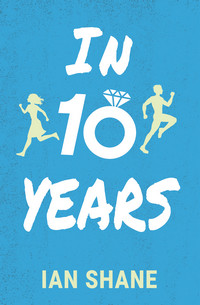 In Ten Years
In Ten Years
by Ian Shane
My original post
A contemporary When Harry Met Sally that makes me just as happy as the movie ever did. Tried and true plotlines that felt fresh thanks to Shane’s light touch and ear for dialogue. It contains what’s probably my favorite chapter of 2021–and more than a couple of my favorite lines. I wanted to race through it to see how it ended, and I wanted to slow down to savor it (the impulse control side lost–what do you expect from someone who tagged himself “Irresponsible”?).

![]()





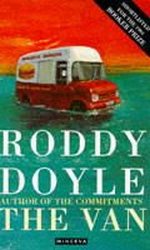
 Jimmy Rabbitte, Sr. started off as a supporting character in The Commitments, moved up to co-star in The Snapper, and finally moves to the forefront in The Van, which is more about him than the other two were about any one person. Which isn’t to say that Jimmy, Jr., Sharon, Veronica, Darren and the twins aren’t here, they’re just in the background — as are most of Jimmy, Sr.’s friends (actually, I think Jr.’s in this far more than he was The Snapper).
Jimmy Rabbitte, Sr. started off as a supporting character in The Commitments, moved up to co-star in The Snapper, and finally moves to the forefront in The Van, which is more about him than the other two were about any one person. Which isn’t to say that Jimmy, Jr., Sharon, Veronica, Darren and the twins aren’t here, they’re just in the background — as are most of Jimmy, Sr.’s friends (actually, I think Jr.’s in this far more than he was The Snapper). 


